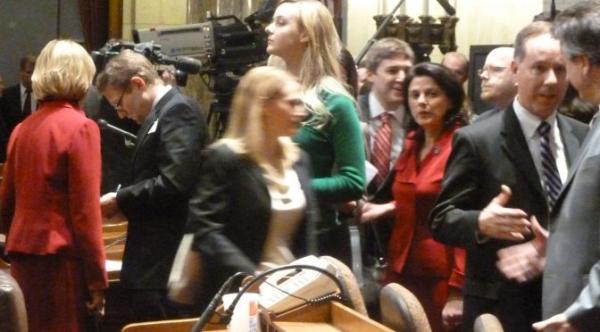UPDATED: News reports indicate State Sen. Leah Vukmir (R-Wauwatosa) has announced plans to run for the Republican nomination to challenge U.S. Sen. Tammy Baldwin (D-WI) in 2018.
As a longtime Wisconsin medical cannabis patient-advocate, I've closely followed the career of Sen. Vukmir, who has made a name for herself as Wisconsin's leading elected cannabis opponent. At the 2009 combined health committee hearing on the Jacki Rickert Medical Marijuana Act (JRMMA), Vukmir, then an Assembly representative, came out swinging, accusing JRMMA sponsors of using cancer patients and calling medical cannabis "a ruse" for full legalization of cannabis. drawing a chorus of loud booing and jeers.
In April 2007, Vukmir, then chairing of the Assembly health committee, told the Wisconsin State Journal, "I will refuse to put members through the circus of a hearing for a bill that is not going to go anywhere. This is nothing more than a backdoor attempt to legalize marijuana, which is not going to happen on my watch."
JRMMA namesake Jacki Rickert fielded a question about Marinol at the 2009 hearing and then addressed Vukmir's "circus" comments:
Here's another video clip from the hearing where Vukmir does not get the answer she was expecting from the WI Medical Society's Dr. Michael M. Miller, an addiction specialist and staunch cannabis legalization opponent himself, discusses the "Gateway Theory" with her.
Billboard targeting WI State Senators Leah Vukmir and Mary Lazich on I-94 in Milwaukee County, straddling their districts.
In 2014, a coalition of Wisconsin activist groups raised the necessary funds to place a billboard along I-94 in Milwaukee County between Vukmir's and then-Senator Mary Lazich's districts..
In the 2015-2016 Wisconsin legislative session, Senate Majority Leader Scott Fitzgerald (R-Juneau) killed CBD legislation at the request of Vukmir and fellow anti-cannabis extremists, Senators Mary Lazich and Duey Stroebel in a procedural move in the last moments of the final Senate session. Vukmir ultimately did vote for a watered-down version that only legalized possession with a doctor's letter, with in-state production and distribution remaining prohibited. SB 10, the 2017-2018 CBD legislation, was passed nearly unanimously by both houses and signed into law by Gov. Scott Walker in April 2017, becoming 2017 Wisconsin Act 4.
Baldwin, on the other hand, has been a supporter of medical cannabis and cannabis law reform dating back to her days in the Wisconsin legislature. In 1997, serving in the state assembly representing Madison, she cosponsored medical cannabis legislation, 1997 AB 560, along with then-State Rep. Frank Boyle (D-Superior), a cancer survivor and passionate supporter of medical cannabis.
In 1998 Baldwin was elected to the U.S. Congress, where she continued her support for medical cannabis. In 2012, she was elected to the U.S. Senate, winning the seat held by longtime U.S. Senator Herb Kohl, who did not seek reelection.
In the 2015 session, Baldwin was among cosponsors of S.683, the Compassionate Access, Research Expansion, and Respect States (CARERS) Act of 2015. In the current session, Baldwin is a cosponsor of S.1008, the Therapeutic Hemp Medical Access Act of 2017.
Several other Republicans are considering challenging Baldwin in 2018, but only one other candidate has officially entered the race, Delafield businessman and U.S. Marine veteran Kevin Nicholson. Another potential candidate is Madison businessman Eric Hovde, told the Milwaukee Journal-Sentinel he'll make a decision by early October.
My best advice to Sen. Baldwin her campaign and Wisconsin Democrats is to make Leah Vukmir own her cannabigoted statements and actions over the years. All but a tiny minority of Wisconsin voters support medical cannabis and the last statewide Wisconsin polling on adult use of cannabis in July 2016 by the Marquette Law School found 59% favor regulating pot like alcohol, a number that has certainly grown in the intervening 14 months and will undoubtedly continue to climb before the Nov. 2018 elections.


